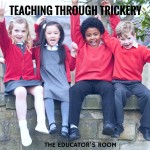I have been a teacher for seventeen years, so yes, there are many lessons or activities that I have done exactly the same every year. I love my discussion on class and power in Romeo and Juliet, I have the same handout that I have been using for my sentence imitation lesson for twelve years, and I still teach grammar the way that I did fifteen years ago.
But I also like to experiment with my lesson plans.
Every year, I try something new. Sometimes, those experiments end badly—for us all. One year, it was a hastily written-out idea for students to create projects using new media. They were excited about the project, but I didn’t really know what I wanted out of it, and so they never quite all got graded. One year, it was assigning students a letter writing essay that was a mix of research, argument writing, and narrative—but for the first quarter of the school year, it was way too much to expect.
But then there are the experiments that turn out so well. When I gave my students an assignment to write a poem in the voice of an immigrant to the US, I was a little nervous about how it would all turn out, but their final drafts were a joy to grade. When I started using interactive notebooks in class, even though we were half way through the last quarter of the year, I loved them, and I have been using them ever since.
Looking back, there are some reasons why the successful experiments worked so well, and why the flops were such big failures.
Here are my tips for successfully trying something risky with your students.
[bctt tweet=”Here are my tips for successfully trying something risky with your students.” username=”EducatorsRoom”]
Think of the end-goal before you do anything else. When I created the poetry writing assignment, I knew that what I wanted was for my students to be able to use literary elements to create meaning and to have a deeper understanding of the unique challenges that immigrants face when they come to America. By nailing down the end game, I made it doable.
Figure out how you will get them to that goal. After I decided what I wanted my students to do with their poems, I planned out all the lessons that would get them there. Essays, stories, and excerpts from a novel all helped them to get a deeper understanding of the immigrant experience. A quick review and explanation of literary elements, handouts that required them to examine those literary elements in multiple poems, and creative writing exercises where they played with writing poems of their own, all added to their comfort and understanding.
Build in as much structure and scaffolding as possible. I don’t always require students to follow a step-by-step process to complete an assignment, but I do always provide those steps for students who work well with a lot of structure. Before I asked them to go home and write an original poem in the voice of an immigrant, I gave them at least three different ways to write a poem that all depended on some kind of already-in-place structure. Imitation poems, found poems, and haikus are all popular choices, and we practiced them in class more than once. Most students started off with one of those and then sort of take off on their own, but having that initial structure is super helpful.
Put yourself out there too. When I ask students to write poems in class, I always write with them, and I am especially sure to read them the bad examples. I don’t care if I look stupid, and I show them that it’s okay to experiment and try something new. And it’s totally great to fail sometimes.
And maybe that’s the lesson here. I’m not afraid to fail, and I want my students to know that sometimes I fall flat on my face.
But I learn from those mistakes, I adjust, and I try again.





